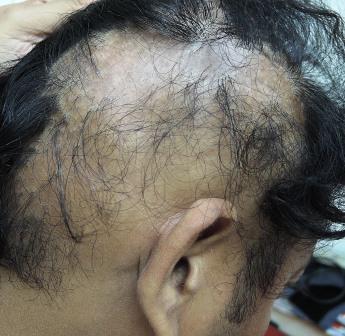
There are several causes of extreme hair loss, including hormonal imbalance, stress, fluctuating blood sugar, poor intestines, and environment. There are several treatment options for extreme hair loss, including natural remedies. If you’re experiencing this condition, you may consider taking saw palmetto, an herb used for treating female hormonal disorders and baldness. Nonetheless, this treatment is not a cure for your hair loss. You may need to wait six to twelve months for the results to show.
In some cases, this condition is linked to telogen effluvium, a temporary condition caused by a stressful life event. Eighty-five percent of healthy hair is in the anagen phase, also known as the resting phase. During this phase, the hair falls out to be replaced with new hair. But if your hair loss persists for longer than a year, you may have to undergo an operation.
Male-pattern hair loss is the most common form of hair loss. Up to 95 percent of people suffering from this condition have a genetic predisposition to hair loss. While it can begin in the late teens, it can also occur as early as the late teens or even younger. Those who are taking certain medications, such as testosterone or steroids, may also experience male-pattern baldness. Ultimately, this type of hair loss can make life miserable.
Other causes of extreme hair loss include skin and scalp problems, excessive use of hair dyes, and unbalanced diets. In severe cases, the loss of hair may indicate malnutrition. Symptoms may include hair thinning or breakage. You should see your primary care physician to rule out any other causes of your hair loss. He or she may refer you to a specialist. These conditions can be treated successfully, but it can be embarrassing for you.
Your doctor will examine your hair and scalp to find out what causes your loss. This professional will ask you about your diet and medications, and check for any unusual changes in your hair or scalp. He or she may even do a scalp biopsy. Blood tests can reveal nutrient deficiencies or underlying conditions. The best treatment for extreme hair loss depends on the cause. Your doctor will also examine your scalp to rule out other health issues that may be causing the problem.

You should consult a physician if you notice excessive shedding of hair. If you notice clumps of hair in your shower drain, this could be a sign of extreme hair loss. If you lose more than 80 strands a day, your doctor may want to examine you further. If you shed less than that amount, it may be time to seek medical attention. You may also want to consult a dermatologist if you’re experiencing hair loss on a daily basis.
Another treatment for severe hair loss is tissue expansion. This involves two surgical procedures. During the first, a tissue expander is placed under the part of the scalp with hair next to the bald spot. This expander stretches out the hair-bearing part of the scalp. In the second surgery, the expanded part of the scalp is pulled over the bald area. For a better result, wear your hair in a loose style so that it doesn’t exert too much pressure on your scalp. Moreover, avoid touching your scalp until it has healed.
Female pattern hair loss is a hereditary condition that affects about 30 million American women. About 50% of them suffer from this disease. It usually starts in the late 50s or early 60s, but can occur at any age. The new hair gets thinner and thinner as the follicles get thinner. This means that it will take longer for hair to grow. It may be necessary to find a psychotherapist to solve the problem.
If you have alopecia, you should see a doctor to get a proper diagnosis. You may have a fungus called lichen planus. This fungal infection causes tufts of hair to fall out. You may also develop sores on your scalp. Your doctor will prescribe medication to fight the fungus and regrow your hair Havita. The most common treatment for this condition is to stop its growth.
Typically, excessive hair loss stops within six to nine months. However, it is better to consult a dermatologist if hair loss is associated with itching or redness. Your doctor can prescribe the best medicine for your condition. If you have a history of stress, consider coping strategies. Eventually, your hair will grow back and you will be able to resume your normal activities. The best way to prevent this condition is to make sure it doesn’t get worse before it starts.

Be First to Comment